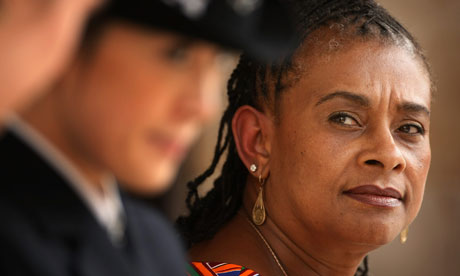Peter Francis's revelations show the need for a judicial inquiry – so the public can see how far our democracy has been eroded

Doreen Lawrence in 2008 at the memorial service marking 15th anniversary of the murder of her son, Stephen.
The revelations by the former NSA operative, Edward Snowden (now to be charged with espionage himself), about the massive extent of state snooping on telephone calls and internet traffic, shocked even the most sanguine. The authorities, however, on both sides of the Atlantic, came out with the same stock response verging on justification: if you are innocent you have nothing to worry about.
The quite disgraceful conduct of police undercover agents described by another whistleblower, Peter Francis, gives the lie to this complacent and arrogant mantra. The perfectly innocent family of Stephen Lawrence was targeted in an attempt to discredit and undermine its quest for truth. Not for the first time has the state tried to depict victims and their families as disreputable and unworthy of belief: Bloody Sunday, Jean Charles de Menezes and Hillsborough are other recent examples.
Besides institutional racism it seems the Metropolitan police was also guilty of institutional deceit. A whole unit was established in order to manage and practise this, within the special demonstration squad (SDS). So much for another mantra commonly trotted out by our leaders that we enjoy freedom of expression and the right to peaceful protest. This will come as no surprise to experienced observers (eg CND in the 1980s, which faced a well-funded government anti-CND propaganda unit and constant surveillance). It is not remotely comforting or reassuring to know that the SDS was disbanded in 2008, given the existence of another outfit, the National Public Order Intelligence Unit, which was charged with tracking green activists.
SDS employed in the region of 130 officers and a number of those were deputed to scratch around for anything they could find on the Lawrences at the very time they should have been devoting resources to what was to become a thoroughly incompetent investigation. They failed to make arrests based on reliable information received within 24 hours; instead we now know that Francis was acquiring alternative information on Stephen's friend and main witness Duwayne Brooks, which might undermine his credibility. Subsequent charges against him were later dismissed.
Additionally, it appears efforts were being made to discover who visited the Lawrence family home and who was involved in a support group, Youth Against Racism. Both home and group were being invaded on an entirely spurious basis.
The general background is far wider than the Lawrence case, embracing many other areas and activities. Officers have adopted false identities, often those of dead infants, played roles which involved intimate relationships with women who rightly feel desperately abused and has been described by one as "like being raped by the state". The Mark Kennedy saga is an exemplification of the scope and depth of infiltration.
In January this year, Maina Kiai, the UN special rapporteur on the rights to freedom of peaceful assembly and of association, provided a highly critical report on violations of human rights in the UK. One of the matters he focused on was the use of undercover policing. He recommended a review of the Investigatory Powers Act 2000 and a judge-led inquiry. Neville Lawrence has demanded exactly that in an interview with the BBC. He is right: we are dealing with potentially unlawful practices and fundamental breaches of the European convention, especially with regard to privacy.
At present there are 16 different inquiries taking place. One of them is Operation Herne, conducted by the chief constable of Derbyshire under the direction of the IPCC. Another is going to be an extension of the Mark Ellison QC review into the question of corruption.
This is manifestly inadequate. Fragmented, protracted and disparate inquiries behind closed doors, let alone carried out by police officers, will hardly restore public confidence already severely dented by denial and deceit. There has to be an independent judge-led public inquiry which incorporates the potential for accountability and transparency. A forum along the lines of Leveson is imperative, so the public can be made aware of how far our democracy has been eroded, and it needs to address the following questions:
1. Authorisation: a squad as big as this does not exist for more than 40 years without approval, if only tacit, at the very highest level. Who knew about it and to whom was it accountable?
2. What were its terms of reference, especially with regard to the unit described by Francis?
3. Funding: substantial sums of public money must have been devoted to this operation. Which budget was used? Who authorised it?
4. Method: who authorised the various techniques employed?
5. Monitoring: how was it regulated? What was Her Majesty's Inspectorate of Constabulary doing? Did they ask the right questions? Were they told the truth?
6. Who decided that the operation would not be disclosed to the Macpherson inquiry?
Once more we must expose collusion, corruption and manipulation. There can be no justice without truth.
